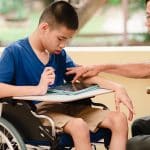Learning in the traditional school system can be difficult for children on the autism spectrum. Though there are specialized schools and learning centers for children and adults with neurodevelopmental disorders, many children still attend mainstream elementary and high schools.
If you have a child on the autism spectrum who is struggling to settle in a mainstream school environment, don’t stress too much. There are several ways you and your child’s teachers and classmates can help to support your child with autism in the classroom.
How Autism Can Affect School Learning
But first, let’s consider how exactly an ASD diagnosis can affect a child’s learning and behavior at school. Autism can affect children in a number of ways that can manifest in the classroom, often making traditional learning environments feel confusing and difficult. These issues can include:
- Processing Delays: Because processing delays are so common in children with autism, it can seriously hamper their ability to read, write, and respond at the same rate as other students. This can place considerable stress on the child in question and make it difficult for them to engage or interact with classroom activities.
- Social Interactions: For many children with autism, day-to-day social interactions are a common struggle. This is heightened in a school environment, where children are expected to understand social dynamics and appropriate interactions in various settings, including the classroom, lunchroom, playground, gym, teachers’ office, etc. It can also lead to isolation and bullying, which can make a child’s struggle much worse.

- Motor Skills: Motor skills can prove to be a major obstacle for children with ASD, making it a struggle to handle pens and pencils well enough to draw and write, which can be a demotivating source of frustration and embarrassment in the classroom.
- Organization: Structure, organization, pre-planning, and time management are all things that people with ASD can struggle with, all of which can have a detrimental effect on their experience in the classroom.
- Sensory Issues: sensory overload affects many children with autism, and can be triggered by many things including voices, bright lights, loud noises, physical touch, and more. All these things can be encountered regularly in the classroom, making it difficult to concentrate on work and classroom tasks.
All of these issues can have a significant effect on your child’s learning, so it is important to find ways to manage or counter them in a school environment.
Strategies For Autism in the Classroom
Thankfully, there are a handful of useful strategies for autism in the classroom that you can implement, to give your child the best chance of a comfortable and productive traditional school experience.
Establish Structure and Routine
For children with ASD, repetition, and routine are important. A steady classroom routine and even a personal daily routine are vital to ensure that your child can get the most out of their in-class learning experience. Routine and predictability will make the child feel safer and more comfortable in the classroom environment. Make sure your child’s teacher is collaborating with you in preparing these routines, so they know what your child needs and what to expect.

Because disruption in a classroom is unavoidable, you and the teacher should also practice introducing disruptions to your child’s routine so they can expect it and respond accordingly, beginning with positive disruptions and slowly building up to negative ones.
Teachers Aide
Though this won’t be possible for everyone, the assistance of a teacher aide is an enormous help for children who are struggling in a classroom environment. Teacher aides are qualified professionals who can help with everything from building classroom routines and preparing activities and course work to hands-on care in the classroom, particularly when your child is experiencing sensory overload. This is an ideal way to supplement any of your child’s needs that their teacher cannot accommodate during class time.
Visual Support
Provide visual support such as flashcards (with images, written words, and/or symbols), miniature figurines, videos, objects of reference, and anything else that will help them to better understand classroom objectives and to break down more difficult activities into smaller tasks.

Raise Awareness In The Classroom
Many neurotypical children who do not have friends or family members with ASD will have little to no experience with students with autism. It’s important that figures of authority, ideally your child’s teacher or teacher aide, can carefully explain to fellow students your child’s needs and differences. They can even explain your child’s sensory issues (if identified) so students know how to avoid any potential triggers in the classroom.
This can also help other students understand how to better interact with your child, communicating their feelings more clearly with their child, as children with autism often struggle to read facial expressions, body language, and other physical cues.
Consider ABA Therapy
Applied Behavioral Analysis (ABA) therapy, is a form of behavioral therapy used to treat autism using a variety of strategies that help people with autism and related disorders to improve positive behaviors, discourage negative behaviors, and build life skills to encourage independence.
ABA sessions also often involve practicing these skills in “real-life” environments, including the classroom. It can help to reduce your child’s fear and anxiety around learning in the classroom, as well as build up coping strategies for the difficulties they may face.
With these strategies, parents, teachers, and students alike can help to assist children with autism who are experiencing difficulties at school. Helping your child to adjust to the routine (or lack thereof) of a traditional school environment will require time and some trial and error, but with enough support and encouragement, they can learn and thrive in the school system as well as any other child.
If you are in need of more information and assistance on catering to students with autism in the classroom, get in touch with our team at Bolling ABA. Our Atlanta-based practice offers consulting services for families and individuals on the autism spectrum and with related disorders. To book your free consultation, send us an email or call us at 404.981.4105.





Recent Comments